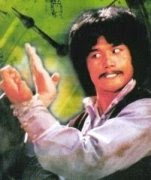Revenge is a theme as old as stories. It's a simple narrative mechanism that cuts to the core of our moral fibre: somebody has been wronged, now they put things right. Psychologists would argue that the theme of revenge can also act as a metaphor for all the struggles in our lives being overcome; and hence revenge has been a crowd-pleaser throughout the centuries, especially among the working classes who historically have incurred the worst deal. Kung Fu movies (and Spaghetti Westerns, or Black Action, etc.) thrive on revenge - ask a friend to parody a line from a Kung Fu movie and they will likely say 'You killed my father, destroyed my school and brought shame to this village!" or some such.
Revenge is therefore a pretty convenient shortcut to getting viewers to root for one side over another, with the added dimension of spectacular violence bringing thrills and danger to the equation. Such convenience can result in, shall we say, certain quality issues. Without having to establish any of a character's background, behaviour or perspective, the mere sight of them being beaten by a gang or having their family victimised is seen as sufficient grounds to set them up as a hero. A richer plot would ensure that we empathise or at least understand a hero on their own grounds, and root for their approach to life/humour/fairness/compassion. In these cases the hero tends to be a more well-rounded character, and because we like them regardless of particular events, we want them to win out regardless of whether they are pursuing vengeance. Good examples here would be David Chiang Da-Wei in The Loot, where the rich , original plot itself is one of the stars, leaving to highly entertaining interplay between the protagonists. Also Jackie Chan in The Young Master: although he is on the losing end of some cheating in the opening dragon dance, there is little stress on personal revenge in achieving the task of getting the Hwang In Sik character behind bars. This allows Jackie to fight throughout in a cheeky and entertaining fashion, including the hilarious end fight which would not have been possible if Jackie had started the fight with revenge driven bloodlust. More recently 'Shiro Obi' (Black Belt) had a triptych of characters with different reactions to the exploitation of their school by the army, showing different shades of revenge and acceptance - each changing subtly throughout the film.
Of course that's not to say revenge is a bad thing for Kung Fu movies (or Spaghetti Westerns, or Black Action, or Heroic Bloodshed etc.). Sometimes, even when overall character depth is not established particularly well, the acting and action can justify it: look at Bruce Lee's boiling rage throughout Fist of Fury, which lacks the more subtle 'benevolent enemy' dimension of Fist of Legend, but is no less entertaining. Or the barely coherent plot of 'Showdown at the Cotton Mill': only by reading the sleeve notes do you (a) work out there's a cotton mill in the film and that (b) there's some sort of corruption underway, but all this is ignored because of the brutal, relentless savage-hero fights of Chi Kuan-Chun. And then of course you have the revenge masterpieces like Lone Wolf & Cub, Lady Snowblood etc. where the act to be revenged is set up early and plays out through the saga, with further revelations of the back story and a long-term goal interspersing the side-action.
It just is very easy to use revenge lazily as a plot device. For example, Five Fingers of Steel was chugging along very nicely, before a brutal extended rape sequence was crowbarred in just to show to everybody just how really, really, bad the baddies were; before adding to the distaste with some infanticide. The 15 minutes this all took would have been much better spent with a Yuen Miu training sequence under the tutelage of Hwang Jang Lee which was sadly lacking in the film. For me the sight of Kwan Young Moon 'Bwa-ha-ha' -ing and Chan Lau toadying was enough villainy for me: I don't expect Shakespeare in my Asian cinema (well, Throne of Blood and Ran excepted ;) but at the same time think that if the writers are stretching themselves at the expense of fight time then there are plenty more ways to establish more depth to the characters' villainy.
Here's hoping that we will see some richer plot narrative in the coming decade - such as Ong Bak 2 where Tony Jaa progressed from 'You stole my idol/elephant' (delete where applicable) to a stronger evolving plotline with ambiguous enemies. Revenge is sweet, but good plotting is sweeter...

No comments:
Post a Comment
Note: only a member of this blog may post a comment.